Looking to learn some beautiful Korean words? You got it.
The Korean language is full of words and phrases that are not immediately translatable into English. Aesthetic Korean words that don’t have a one-word English counterpart and require explanation.
In this guide, you’ll learn 15+ beautiful words and phrases.
So, let’s jump in.
So, keep reading on below.
1. 순리대로 [Sunri/Sulli daero]
- Nature’s course
‘Sulli daero’ has an ambiguous meaning, flickering between ‘nature’s course’ and ‘going with the flow’. It is often used in the context where a person decides on letting nature or life take its course.

On the opposite end, 순리를 거역하다 (Sulli-reul geoyeok-hada) means going against the laws of nature.
2. 눈치 [Nunchi]
- the subtle art and ability to listen and gauge others’ moods
Literally, it means ‘eye measure.’ You’d otherwise know it as “reading the room” or “the atmosphere.” You know, by paying close attention to people’s body language, tone of voice, and words spoken.
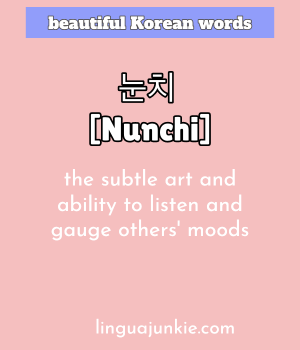
Since, Korean is a high-context culture so Nonchi is a must. If you can’t read others (as in, if they’re getting bored with you or have somewhere to go), you’re going to be awkward and struggle socially.
2. 윤슬 [Yoonseul]
- Ripples that glisten in the light
Yoonseul refers to things (usually sea/ocean ripples) that sparkle in the reflection of sunlight or moonlight as undulating waves. It’s a beautiful Korean word that has you imagining the sparkling water that is usually seen in movies.
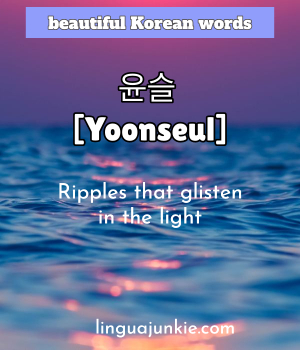
3. 띠동갑 [Ddi-dong-gab]
- Chinese Zodiac twins/buds
Have you ever heard someone say, “I was born in the year of the tiger”?
The Chinese Zodiac, or Ddi, is based on a cycle of twelve years, and each year of the cycle corresponds to a certain animal sign. The 12 animals are Rat, Ox, Tiger, Rabbit, Dragon, Snake, Horse, Sheep, Monkey, Rooster, Dog and Pig. Every animal has a set of characteristics, and it is said that everybody born in that year has the same characteristics. Two people who have the same animal sign are referred to as Ddi-donggab.
4. 마수 걸이 [Masu Geori]
- First sale of the day
Among some untranslatable Korean words that Kim Soo-young, a Korean poet, chose there is ‘Masugeol’. ‘Masu’ means the devil’s hand, and ‘Georeuda’ means to skip a certain order. In other words, it means ‘to pass without being caught in the hands of the devil’. If you can’t sell something to the first customer, you can’t sell it all day long, so no matter what happens, you try to sell it to the first customer.
5. 정 [Jeong]
- Emotional bond
Jeong can be described as an emotional/psychological bond– in the broadest sense. One that includes feelings like affection, sympathy, compassion, attachment and adoration. It also acts as a suffix for words like emotion, temper, stability and fairness.
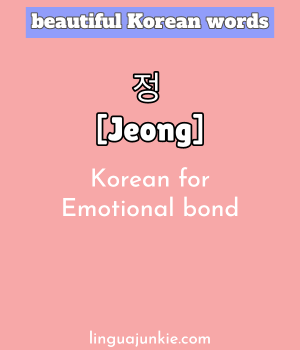
6. 썸 [Sseom]
- Courting/the period between liking someone and dating
If you know Kpop, the first thing that comes to mind is the group Bol4’s ‘Sseom’ right?
The word Sseom might have originated from the English word ‘some’. It has to do with flirting, however, it actually denotes the indistinct period between liking someone and getting to the first stage of dating. A very handy term, I must say.
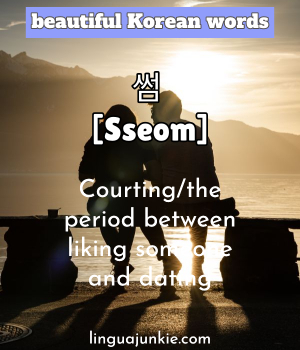
7. 눈빛 [Nunbich/Nunbit]
- Emotions expressed through the eyes
Even though Nunbich literally translates to ‘Light of the eyes’, it usually means the expression of one’s eyes. It could be used to explain emotions reflected through the eyes, and actions like glaring, beaming, staring, frowning, sparkly eyes, etc. Something you’d see from really good actors.
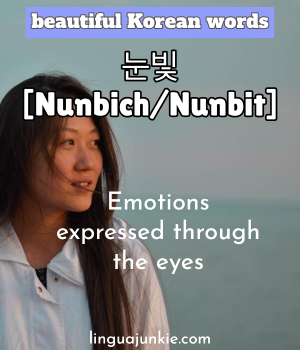
8. 출근–퇴근 [Chulgeun-Toegeun]
- Arriving at and Leaving work
This is an everyday word that Koreans use for arriving at the workplace (출근) and leaving work to go home (퇴근). It’s a very convenient term for all workplaces and is often heard in Korean Dramas.
9. 몸살 [Momsal]
- “I’m doing to do… “
Ache all over one’s body and muscles from fatigue/cold are often expressed as 몸살, according to the Korean dictionary. It also serves as an idiom for eagerness or as we say “I’m dying to do –“.
10. 주제 [Juje]
- Social position
Although this word means ‘subject/theme’, it has another commonly used meaning. Juje is a word used to describe a person’s position or situation. It’s an abbreviation of 주제꼴 (Juje-kkol), an outdated term that roughly translates to ‘impertinent’ or ‘shabby’. You need to be careful with it, as it is often used to belittle someone — kind of like calling someone shabby.
주제넘게 (Juje-neom-ge) is to ‘cross the line, impertinently).
11. 텃세 [Teosse/Teotsse]
- Being territorial
Teosse is used to describe the state of a person who’s acting high-and-mighty with a person who joins comes along later. For example, think of school where seniors act unfriendly to freshmen.
12. 암팡지다 [Ampangjida]
- Small but strong
This weirdly flattering word is used to describe anything strong, capable, stubborn or sharp despite a small, petite, short or sloppy appearance. Kind of like an underdog.
13. 검정새치 [Geomjeong Saechi]
- Hypocrite/spy
Geomjeong saechi– meaning Black Gray hair, is a metaphor for an outsider who acts as a spy while pretending to be on the same side.
Originally, ‘saechi’ is premature grey hair, which you can easily see between black hair. But, if the color of grey hair is black, you won’t be able to tell if it’s ‘saechi’.
14. 두루치기 [Duruchigi]
- Jack of all trades
Literally, Duruchigi is a Korean dish with stir-fried meat and vegetables. The name of this dish is ALSO used for people who excel at various jobs.
15. 가르친사위 [Gareuchin sawi]
- Someone incapable of independent actions
Literally meaning ‘A taught son-in-law’, Gareuchin sawi is a demeaning word for a person who is unable to do anything by themselves or someone who does only what others teach him without any subjectivity or personal thoughts.
Conclusion — Back to You
Now you know some beautiful Korean words and expressions.
Which one was your favorite? Leave a comment.
Also, if you want to learn and speak even more Korean, here’s a 3-minute Korean audio lesson that’ll teach you how to say “Korean Greetings.”
- 3-Minute Korean Lesson #2 – Greetings
- Free Lesson by KoreanClass101.com – click here for more free audio lessons.
– The Main Lingua Junkie